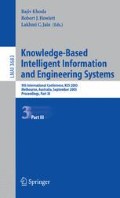Abstract
The use of probabilistic reasoning is a key capability in information fusion systems for a variety of domains such as military situation assessment. In this paper, we discuss two key approaches to probabilistic reasoning in military situation assessment: Probabilistic Relational Models and Object Oriented Probabilistic Relational Models. We compare the modeling and inferencing capabilities of these two languages and compare these capabilities against the requirements of the military situation assessment domain.
Access this chapter
Tax calculation will be finalised at checkout
Purchases are for personal use only
Preview
Unable to display preview. Download preview PDF.
References
Lambert, D.A.: Grand Challenges of Information Fusion. In: Proceedings of the Sixth International Conference on Information Fusion, Cairns, Queensland (2003)
Steinberg, A.N., Bowman, C.L., White, F.E.: Revisions to the JDL Data Fusion Model. In: The Joint NATO/IRIS Conference, Quebec, Canada (1998)
Howard, C., Stumptner, M.: Situation Assessment with Object Oriented Probabilistic Relational Models. In: Proceedings of the Seventh International Conference on Enterprise Information Systems, Miami (2005) (to appear)
Wright, E., et al.: Multi-Entity Bayesian Networks for Situation Assessment. In: Proceedings of the Fifth International Conference on Information Fusion (2002)
Laskey, K.B., Mahoney, S.M.: Network Fragments: Representing Knowledge for Constructing Probabilistic Models. In: Proceedings of the Thirteenth Annual Conference on Uncertainty in Artifical Intelligence (UAI 1997), Morgan Kaufmann, Providence (1997)
Das, S., Grey, R., Gonsalves, P.: Situation Assessment via Bayesian Belief Networks. In: Proceedings of the Fifth International Conference on Information Fusion, Annapolis, MD, USA (2002)
Blandon, P., Hall, R.J., Wright, W.A.: Situation Assessment Using Graphical Models. In: Proceedings of the Fifth International Conference on Information Fusion, Annapolis, MD, USA (2002)
Sutton, C., et al.: A Bayesian Blackboard for Information Fusion. In: Proceedings of the Seventh International Conference on Information Fusion, Stockholm, Sweden (2004)
Suzic, R.: Representation and Recognition of Uncertain Enemy Policies Using Statistical Models. In: Proceedings of the NATO RTO Symposium on Military Data and Information Fusion, Prague, Czech Republic (2003)
Okello, N., Thoms, G.: Threat Assessment Using Bayesian Networks. In: Proceedings of the Sixth International Conference on Information Fusion, Cairns, Queensland (2003)
Pfeffer, A.J.: Probabilistic Reasoning for Complex Systems, PhD thesis in Department of Computer Science, Stanford University, pp. 304 (1999)
Koller, D., Pfeffer, A.: Probabilistic Frame-Based Systems. In: Proceedings of the Fifteenth National Conference on Artificial Intelligence (AAAI 1998), Madison, Wisconsin (1998)
Getoor, L.: Learning Statistical Models From Relational Data, PhD thesis in Department of Computer Science, Stanford University, pp. 189 (2002)
Pasula, H.M.: Identity Uncertainty, PhD thesis in Department of Computer Science, University of California, Berkeley (2003)
Bangso, O.: Object Oriented Bayesian Networks, PhD thesis in Department of Computer Science, Aalborg University, pp. 110 (2004)
Koller, D., Pfeffer, A.: Object-Oriented Bayesian Networks. In: Proceedings of the Thirteenth Annual Conference on Uncertainty in Artifical Intelligence (UAI 1997), Morgan Kaufmann, Providence (1997)
Bangso, O., Flores, M.J., Jensen, F.V.: Plug and Play Object Oriented Bayesian Networks. In: Conejo, R., Urretavizcaya, M., Pérez-de-la-Cruz, J.-L. (eds.) CAEPIA/TTIA 2003. LNCS (LNAI), vol. 3040, Springer, Heidelberg (2004)
Bangso, O., Wuillemin, P.-H.: Object Oriented Bayesian Networks. A Framework for Top Down Specification of Large Bayesian Networks with Repetitive Structures, Technical Report CIT-87.2-00-obphw1, Department of Computer Science, Aalborg University (2000)
Bangso, O., Wuillemin, P.-H.: Top Down Construction and Repetitive Structures Representation in Bayesian Networks. In: Proceedings of the Thirteenth International Florida Artificial Intelligence Research Society Conference, AAAI Press, Menlo Park (2000)
Pfeffer, A., et al.: SPOOK: A System for Probabilistic Object Oriented Knowledge Representation. In: Proceedings of the Fifteenth Conference on Uncertainty in Artificial Intelligence, UAI 1999 (1999)
Flores, M.J., Gamez, J.A., Olsen, K.G.: Incremental Compilation of a Bayesian Network. In: Proceedings of the Nineteenth Conference on Uncertainty in Artificial Intelligence, Morgan Kaufmann, San Francisco (2003)
Sanghai, S., Domingos, P., Weld, D.: Dynamic Probabilistic Relational Models. In: Proceedings of the Eighteenth International Joint Conference on Artificial Intelligence, Mexico (2003)
Author information
Authors and Affiliations
Editor information
Editors and Affiliations
Rights and permissions
Copyright information
© 2005 Springer-Verlag Berlin Heidelberg
About this paper
Cite this paper
Howard, C., Stumptner, M. (2005). Probabilistic Reasoning Techniques for the Tactical Military Domain. In: Khosla, R., Howlett, R.J., Jain, L.C. (eds) Knowledge-Based Intelligent Information and Engineering Systems. KES 2005. Lecture Notes in Computer Science(), vol 3683. Springer, Berlin, Heidelberg. https://doi.org/10.1007/11553939_7
Download citation
DOI: https://doi.org/10.1007/11553939_7
Publisher Name: Springer, Berlin, Heidelberg
Print ISBN: 978-3-540-28896-1
Online ISBN: 978-3-540-31990-0
eBook Packages: Computer ScienceComputer Science (R0)

